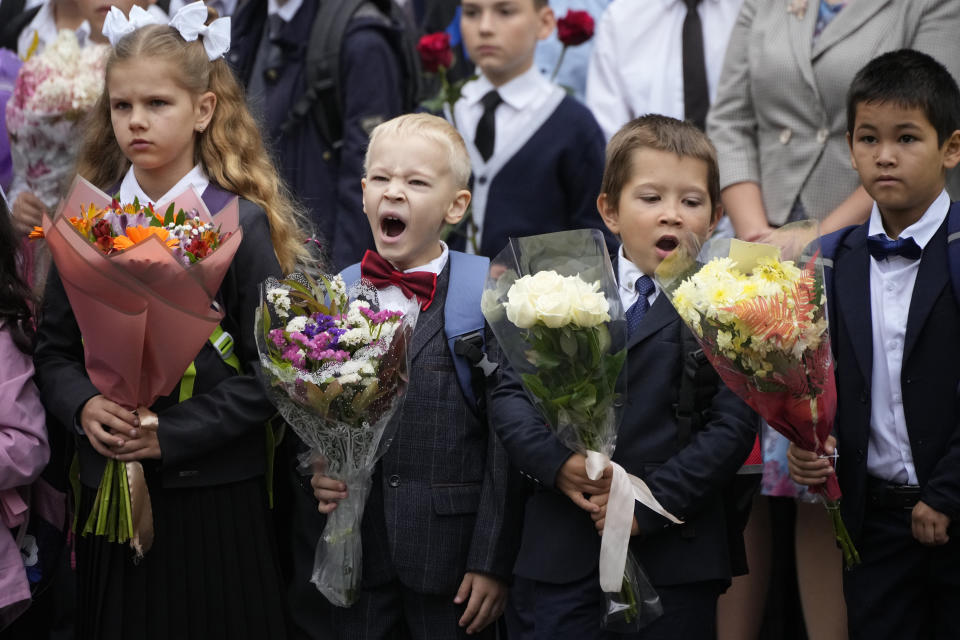Children in Russia are returning to school, where the Kremlin’s narratives about the war in Ukraine and its confrontation with the West are taking an even more prominent spot than before. As part of the curriculum, students are expected to listen to Russia’s national anthem and watch the country’s flag being raised each week. There is also a weekly subject called “Conversations about Important Things,” which aims to boost patriotism.
The influence of the Kremlin in schools has increased in recent years, with a new high school history textbook including a chapter on the annexation of Crimea and the “special military operation” in Ukraine. Basic military training is now included in a course on self-defense and first aid. President Vladimir Putin himself met with 30 school students from different regions, describing Russians as “an invincible nation.”
The Kremlin’s focus on young people began several years ago when teenagers and students participated in unauthorized protests organized by opposition leader Alexei Navalny. The government realized that a whole generation of people who grew up with Putin as president could think differently than the Kremlin wanted them to. As a result, authorities started investing in pushing their political narrative.
There have been reports of teachers punishing students who express support for the opposition or anti-government views. The crackdown intensified after Moscow sent troops to Ukraine, and teachers were fired or forced to quit for refusing to hold sessions of “Conversations About Important Things.” Parents also faced pressure from school administrators and authorities if their children skipped those lessons.
Some parents are concerned about the mandatory lessons and the militarization of their children’s minds. They worry that history textbooks are being rewritten and mandatory ideology is being imposed. They feel that Russian schools are rapidly turning back to the worst Soviet examples, where two histories and two truths existed.
However, some parents are fortunate to have their children attend schools where teachers are not strictly following the directives and are trying to stay away from politics. These teachers come up with their own content for lessons, focusing on depoliticized topics without ideology.
Overall, the increased influence of the Kremlin in Russian schools has raised concerns among parents about the indoctrination of their children. They feel that they have fewer opportunities to protect their kids from brainwashing. However, some parents are hopeful that well-educated and critical-thinking teachers will be able to circumvent the requirements and quietly sabotage the imposed ideology.
Follow AP’s coverage of the war in Ukraine at https://apnews.com/hub/russia-ukraine.

What are the concerns surrounding the emphasis on patriotism and loyalty to the state in the Russian education system, and how does it potentially impact the development of independent thinking and critical analysis among students
In Russia started participating in the annual youth patriotic forum called “Seliger.” The forum, organized by the government’s Federal Agency for Youth Affairs, aims to promote patriotism, social responsibility, and loyalty to the state among young people.
In addition to the changes in the curriculum, the Kremlin has also taken steps to ensure its narratives and values are instilled in children from a young age. For example, youth groups like the Young Army have gained popularity in recent years, with more than 600,000 members nationwide. The Young Army encourages children as young as 10 to engage in military-style activities and learn about Russia’s military history, fostering a sense of national pride and loyalty to the state.
However, while the Kremlin’s efforts may be seen as promoting patriotism, critics argue that they are also aimed at shaping a generation of citizens who unquestioningly support the government’s policies and narratives. They claim that the emphasis on patriotism in education and youth organizations stifles critical thinking and limits exposure to alternative viewpoints.
The increased influence of the Kremlin in schools reflects its broader goal of consolidating power and maintaining control over the country’s narrative. By shaping the minds of the younger generation, the Kremlin aims to ensure a loyal and compliant citizenry that supports its agenda. However, it also raises concerns about the impact on the development of independent thinking and the ability to critically analyze information, which are crucial in a democratic society.
As children in Russia return to school, they are not only learning academic subjects but also being exposed to a curriculum that promotes the Kremlin’s narratives about the war in Ukraine and its confrontation with the West. The increasing prominence of these narratives, along with the emphasis on patriotism and loyalty to the state, raises questions about the future of education and critical thinking in Russia.



It’s concerning how the government is using education to manipulate young minds and promote their patriotic agenda.
This is a clear example of the Kremlin’s efforts to mold and control the youth, shaping them into loyal citizens who support the government’s ideologies and propaganda.